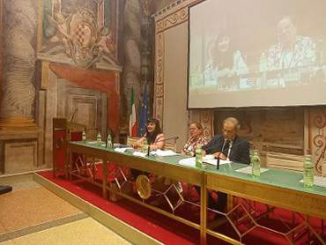
Italy: Government reform to ban politicians
from returning to judiciary roles
Italian Justice Minister Marta Cartabia, Premier Mario Draghi and Economy and Finance Minister Daniele Franco meet the media following a cabinet meeting in Rome on Friday
The Italian government approved a key reform to the country’s much-criticised justice system, making it impossible for magistrates to jump directly from judicial careers to politics and back again.
Reforms for the country’s justice system are among several requirements imposed by the European Union for Italy to receive billions of euros in pandemic recovery funds.
Among those over the last few decades who have pushed for reform of rules for magistrates has been Silvio Berlusconi, the former centre-right prime minister. He contended that left-leaning prosecutors had targeted him and his media empire to damage him politically. At a Cabinet meeting on Friday, the government decided on various measures to limit magistrates’ switching back and forth between their justice roles and politics, both on national and local levels.
Parliament must now take up the reforms to convert them into the law of the land.
Under the measures, magistrates who run for elected office can’t do so in the regions where they either served as judges or prosecutors in the previous three years.
If they are elected after their political post ends, they won’t be able to serve in any judicial capacity, with the Justice Ministry assigning them to administrative roles.
For those magistrates who run for political office but fail to be elected, three years must pass before they can again carry out judicial duties.
The reform aims to put an end to the practice of “revolving door magistrates who take on a political post,” Justice Minister Marta Cartabia told reporters after the Cabinet meeting.
The former head of Italy’s Constitutional Court herself, Cartabia is now serving in the Cabinet in a non-political role as part of the pandemic unity government formed last year by Prime Minister Mario Draghi.
Draghi, an ex-chief of the European Central Bank, is also considered a technocrat.
“We owe it to the citizens who have the right to regain full trust in our magistrate system,” Cartabia said. Careers as a magistrate have not rarely served as springboards into politics.
One such example is Antonio Di Pietro, one of the Milan-based Clean Hands prosecutors whose kickback probes in the 1990s swept away an entire political class. Shortly after, Di Pietro jumped into politics, becoming a minister and forming his own centre-left political movement.
Italy’s often slow-moving justice system is viewed as a discouragement for investors and entrepreneurs from doing business in Italy.
“In general, predictable, sure justice in rapid time favours foreign investment,” Draghi said. But a more complete overhaul of Italy’s justice system still “is a long road,” he said.




Be the first to comment